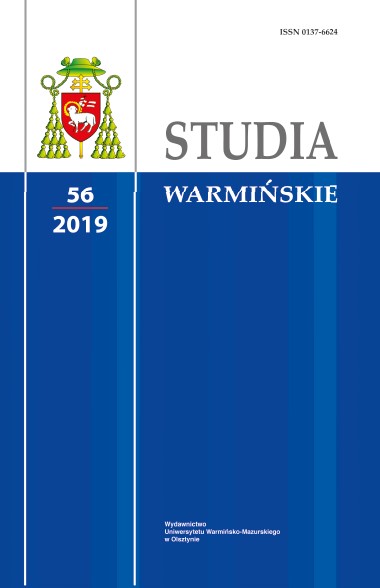Prymat Biskupa Rzymu w ujęciu wspólnot eklezjalnych wyrosłych z reformacji
The Primacy of the Bishop of Rome from the Perspective of Ecclesiastical Communities Born out of the Reformation
Author(s): Paweł RabczyńskiSubject(s): History of Church(es), 16th Century, Biblical studies, Systematic Theology, Other Christian Denominations
Published by: Wydawnictwo Uniwersytetu Warmińsko-Mazurskiego w Olsztynie
Keywords: primacy of the Bishop of Rome; ecumenism; church communities born out of the reformation; Symbolical Books of the Evangelical Lutheran Church; Catholic-Lutheran dialogue;
Summary/Abstract: The article is a synthetic attempt at presenting the subject of the primacy of the Bishop of Rome from the perspective of church communities born out of the reformation. The Roman Catholic Church continuously asserts that the primacy of the Bishop of Rome is Christ’s gift to the Church as a necessary service for the sake of ecclesiastical unity. The realization of this service is carried out by performing the highest and universal teaching duty, entailing in some cases also the privilege of inerrancy, and the ecclesiastical duty necessary in order to strengthen and defend the unity of faith and ecclesiastical community. The Lutheran understanding of the primacy of Peter’s Successor can be found in the Symbolical Books of the Evangelical Lutheran Church and the document of the Catholic-Lutheran dialogue. This subject matter is present in the Augsburg Confession of 1530, the Smalcald Articles of 1537 and Treatise on the Power and Primacy of the Pope of 1537. In these publications belonging to the collection of the Symbolical Books of the Evangelical Lutheran Church the primacy of the Bishop of Rome is considered to be a human-made concept and a usurpation of divine authority. Dominant is the conviction regarding the need for rejecting the hierarchical structure of the Church. The Catholic-Lutheran dialogues undertaken after the Second Vatican Council highlighted the doctrinal differences regarding the nature and form of performing primacy, the existence of primacy succession, the origin of the position of Peter’s Successors (de iure divino or de iure humano), the jurisdiction of the Bishop of Rome over the Catholic Church. The ecumenical hope is born out of the common and mutual conviction about the need of continuing the bilateral dialogue on the service of primacy and the assertion that the primacy of Peter’s Successor should unequivocally serve the Gospel and the unity of the Church.
Journal: Studia Warmińskie
- Issue Year: 56/2019
- Issue No: 56
- Page Range: 227-248
- Page Count: 22
- Language: Polish

